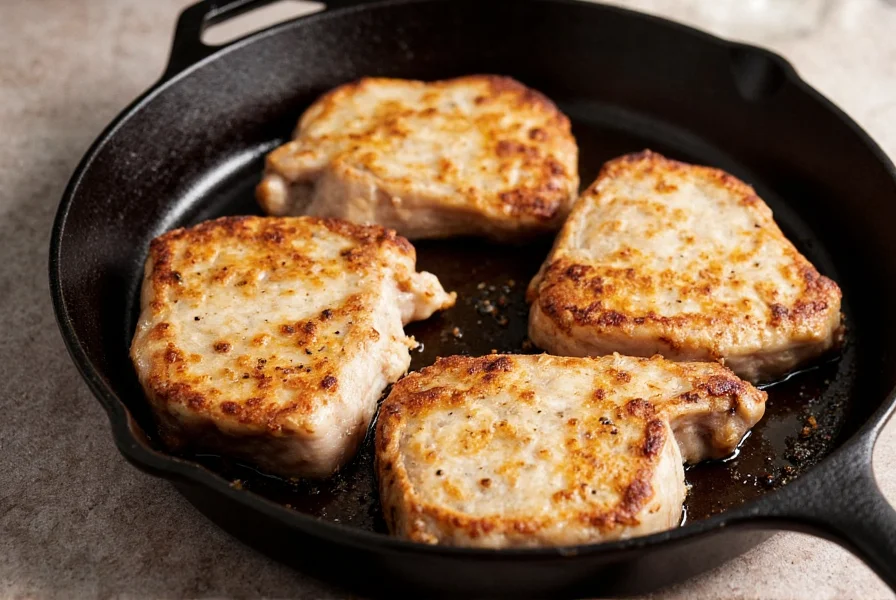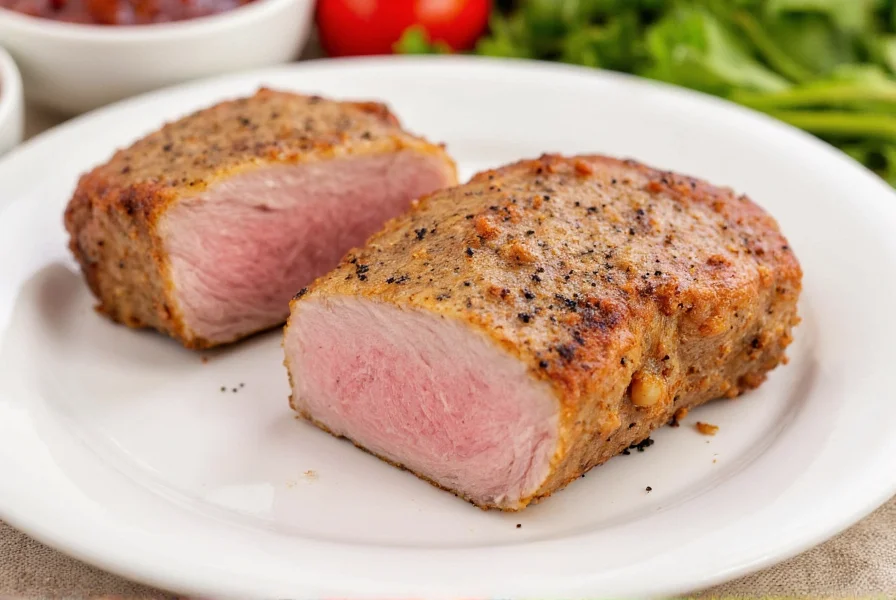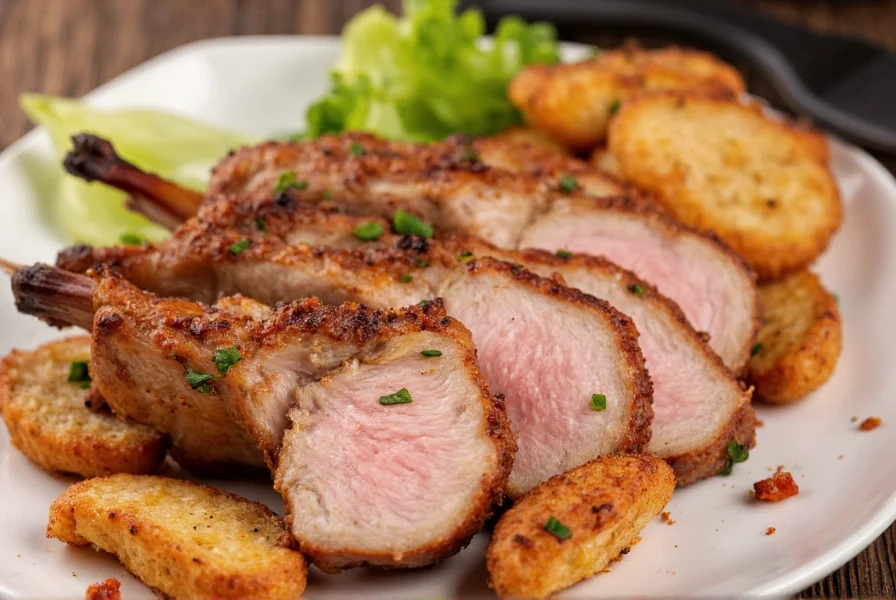Mastering the art of salt and pepper pork chops transforms this simple cut into a restaurant-quality meal with minimal ingredients. The magic happens when you understand the science behind seasoning and cooking techniques that maximize flavor development while maintaining moisture. This guide reveals professional methods for achieving perfectly seasoned, evenly cooked pork chops every time, whether you're using bone-in or boneless cuts.
The Science Behind Perfect Seasoning
Understanding how salt and pepper interact with pork changes your cooking results dramatically. Salt doesn't just add flavor—it modifies protein structure through osmosis, allowing meat fibers to retain more moisture during cooking. When you apply salt 45-60 minutes before cooking, it has time to penetrate beyond the surface, seasoning the entire chop rather than just creating a salty exterior.
For optimal results when preparing salt pepper pork chop dishes, use kosher salt instead of table salt. Its larger crystals distribute more evenly and dissolve at the ideal rate. Freshly ground black pepper provides complex flavor notes that pre-ground pepper lacks, with volatile oils that enhance the natural sweetness of pork.
| Pork Chop Thickness | Salt Amount | Pepper Amount | Rest Time Before Cooking |
|---|---|---|---|
| ½ inch | ¾ tsp | ¼ tsp | 30 minutes |
| 1 inch | 1 tsp | ½ tsp | 45 minutes |
| 1½ inches | 1¼ tsp | ¾ tsp | 60 minutes |
Step-by-Step Cooking Method for Best Results
Follow these precise steps for the best way to season pork chops with salt and pepper and achieve perfect doneness:
- Remove chops from refrigerator 30 minutes before cooking
- Pat completely dry with paper towels
- Apply recommended seasoning amounts evenly on both sides
- Let rest at room temperature for specified time
- Preheat cast-iron skillet over medium-high heat for 5 minutes
- Add high smoke-point oil (avocado or grapeseed)
- Sear chops 3-4 minutes per side until golden brown crust forms
- Transfer to 400°F oven and cook until internal temperature reaches 145°F
- Rest 5 minutes before serving

Avoiding Common Mistakes
Many home cooks make critical errors when preparing simple salt pepper pork chop recipe dishes. The most frequent mistake is moving chops too soon after placing them in the pan—wait until they release naturally from the skillet surface. Another common issue is overcrowding the pan, which lowers the temperature and prevents proper crust formation.
Understanding when to season pork chops before cooking makes a significant difference. Seasoning immediately before cooking creates surface moisture that inhibits browning, while seasoning too far in advance (more than 24 hours) can make the texture too firm. The 45-minute window provides the ideal balance for moisture retention and crust development.
Temperature Guide for Perfect Doneness
Use an instant-read thermometer to verify doneness—this is the most reliable method for how long to cook salt pepper pork chops. Pork should reach 145°F internally, followed by a 3-5 minute rest period where temperature will rise another 5-10 degrees. This yields juicy, slightly pink meat that's safe to eat according to USDA guidelines.
For those wondering what temperature to cook salt pepper pork chops, remember that oven temperature should be 400°F after searing. The exact time varies based on thickness, but generally takes 6-10 minutes in the oven for 1-inch chops. Never rely solely on timing—always use a thermometer for accuracy.
Variations and Serving Suggestions
While the classic salt pepper pork chop preparation shines with minimal ingredients, you can enhance it with simple additions. After searing, add fresh thyme sprigs and smashed garlic cloves to the pan, then baste the chops with the aromatic oil during the final cooking minutes. A squeeze of fresh lemon juice just before serving brightens the rich flavors.
Pair your perfectly cooked chops with roasted vegetables or a crisp green salad. For an elegant presentation, slice thick chops against the grain and fan them on the plate. The natural juices that collect during resting make an excellent light pan sauce when deglazed with a splash of chicken stock.

Storage and Reheating Tips
Properly stored, cooked salt pepper pork chop leftovers maintain quality for 3-4 days in the refrigerator. Place chops in an airtight container with any pan juices. When reheating, avoid the microwave which dries out the meat. Instead, warm gently in a covered skillet over low heat with a tablespoon of broth or water to maintain moisture.
For meal prep purposes, you can freeze seasoned raw chops for up to 3 months. Place between parchment paper in a freezer bag with all air removed. Thaw overnight in the refrigerator before cooking for best results with your simple salt pepper pork chop recipe.
What's the ideal salt to pepper ratio for pork chops?
The ideal ratio is 2:1—use 1 teaspoon of kosher salt to ½ teaspoon of freshly ground black pepper per 1-inch thick pork chop. This balance enhances pork's natural flavor without overwhelming it. Adjust slightly based on personal preference, but maintaining this proportion ensures proper seasoning penetration and flavor development.
How long should I let salt and pepper pork chops rest before cooking?
Allow salt and pepper pork chops to rest for 45 minutes at room temperature after seasoning. This gives salt time to penetrate the meat through osmosis, improving moisture retention during cooking. For thicker cuts (1½ inches or more), extend to 60 minutes. Never skip this step when following a salt pepper pork chop recipe—it's crucial for achieving juicy results with a perfect crust.
What's the best pan for cooking salt and pepper pork chops?
A preheated cast-iron skillet delivers the best results for salt and pepper pork chops. Its superior heat retention creates an even sear and perfect crust formation. Preheat the skillet for at least 5 minutes over medium-high heat before adding oil. Avoid non-stick pans which don't achieve high enough temperatures for proper browning. For the best way to season pork chops with salt and pepper, cast iron is the professional choice.
Can I use table salt instead of kosher salt for pork chops?
While you can use table salt, kosher salt is preferred for salt pepper pork chop preparation. Table salt is denser and contains anti-caking agents that can create uneven seasoning. If substituting, use about half the amount of table salt compared to kosher salt. The larger crystals of kosher salt distribute more evenly and dissolve at the ideal rate for proper meat penetration without making the chop overly salty.
How do I prevent salt and pepper pork chops from drying out?
Prevent dryness by following these key steps for your simple salt pepper pork chop recipe: 1) Season properly 45 minutes before cooking, 2) Pat chops completely dry before seasoning, 3) Use high heat for searing but finish in the oven at 400°F, 4) Cook to 145°F internal temperature (not higher), 5) Rest for 5 minutes after cooking. These techniques ensure maximum moisture retention while developing flavor and texture.











 浙公网安备
33010002000092号
浙公网安备
33010002000092号 浙B2-20120091-4
浙B2-20120091-4